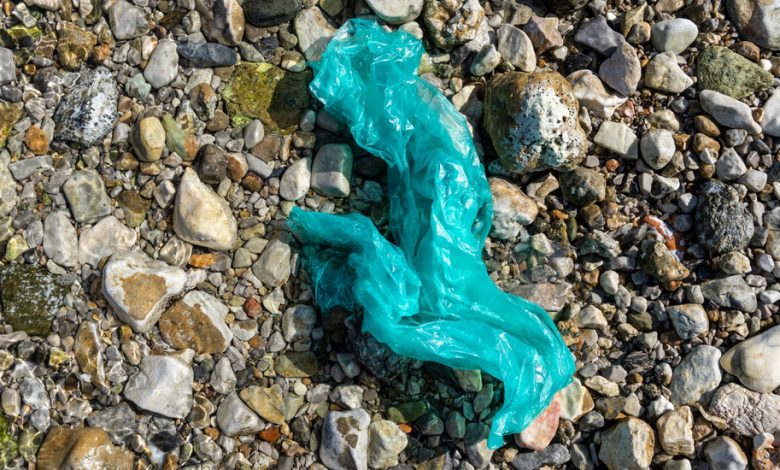The Soothing Futility of Picking Up Beach Trash

From spring until late fall, when winter weather drives me indoors to the treadmill, I spend 20 minutes each morning after my run around the Back Cove in Portland, Maine, walking the shoreline, picking up garbage. Every day is Groundhog Day — I gather plastic cups, syringes, food containers and cigarette butts the same as the morning before, and the same as the morning before that.
I should almost certainly feel despair battling the daily fallout as late capitalism enters hospice care. But instead I get a base, primal satisfaction from actually just doing something, no matter how insignificant. We’ve forgotten, maybe, as the virtual world has slowly co-opted our lives, that we are meant by nature to move through and manipulate, to lift and carry and sort and transfer. Simple acts, I’ve found, have an outsized effect on the worrying over abstractions that otherwise takes up so much of my time.
My education in this regard started one morning a few years ago, when, getting ready for a run, I looked up and saw a sea gull with what looked like a small fish clutched in one of her feet. It wasn’t a fish but a fishing lure, and its barbed hook had stabbed the gull’s foot and lodged there. She flew wide, despairing circles above me, trying to shake the hook loose while other birds, seemingly making the same mistake I’d made in thinking the lure was an actual fish, gave chase.
That day, instead of doing a more conventional walk-and-stretch after running, I finally acted on an impulse I’d had many times and started moving slowly along the perimeter of the cove, picking up garbage. My grief over the gull’s suffering receded ever so slightly as I went.
The satisfaction I get from this habit is not uncomplicated. Sometimes I take paradoxical pleasure in getting dirty with other people’s trash, and other times the surprise dollop of last night’s honey mustard sauce on my shoe is enough to send me directly over the edge.
But the daily practice has taught me to be on guard against my own vanity — to notice and discard the smug feeling that sometimes arises when I see others enjoying the cove but doing nothing about how blighted it is. Instead I am confronted each day with my own fallibility, tininess and hypocrisy (as just one more trash ape among billions, I contribute to the problem simply by existing). And instead of puffing myself up, I check myself and reach for more garbage.
There are likely more effective things I could be doing with my time. We live in an age when efficiency and optimization are prized above all else, and what could be less efficient than gathering scraps of garbage by hand when the equivalent of a dump truck of plastics enters the oceans every minute? So I’ve tried to think, and do, bigger.
I’ve thought about sabotaging a pig farm or an oil rig, but have had to admit to myself that I’m ultimately not a radical. I’ve considered giving up my work as a writer for a career in ecological activism, but the whole reason I do this work is because I am at heart a loner. I mistrust groups larger than, say, half a dozen people. In my experience, that’s when we start getting a little too certain about what everyone on our side of the line believes, usually to the detriment of ourselves and everything else.
In short, I’m skeptical both of working within any system and of trying to upend it. Which is another way of saying I’m skeptical of my own species. It’s hard not to be, given the evidence. Climate change and other ecological consequences of human activity are both incomprehensibly huge and diffuse, and thus easy to distance ourselves from. Our very own personal garbage, however, and our habits in disposing of it, are not so easy to disavow — and they are damning.
So instead of blowing up a plastics factory, I go and gather garbage by myself most days. And occasionally something will occur that happily disproves my dim view of humanity. People will notice me, and wonder what I’m doing all sweaty and breathless down there among the marsh grass and the rocks. I present an intriguing enough figure for them to stop, in the midst of their preoccupations with the day, and take the time to discern what I’m up to. And when they figure out that I am, in fact, picking up garbage, sometimes — not often, but occasionally — they’ll come and join me. We’ll chat or, more likely, we won’t do much other than exchange hellos, or simply nod. Just a couple of strangers doing something small and futile together, for no other reason than that it’s right. The kind of modest, workaday miracle that feels like it could, with any luck, lead to something bigger.
It seems near all but certain that we are, as a species, too shortsighted and distractible, too enamored of dividend checks and retail therapy, to really turn this ship around. But, then, despair and idealism are two sides of the same cop-out, and I’ve indulged in both more than enough in my time. So I’ll keep splitting the difference, keep picking up trash — and keep hoping that simply setting an example can be meaningful.
Ron Currie Jr. is the author of the novel “The One-Eyed Man” and a writer for film and television, most recently for the series “Extrapolations.”
The Times is committed to publishing a diversity of letters to the editor. We’d like to hear what you think about this or any of our articles. Here are some tips. And here’s our email: [email protected].
Follow The New York Times Opinion section on Facebook, Twitter (@NYTopinion) and Instagram.



